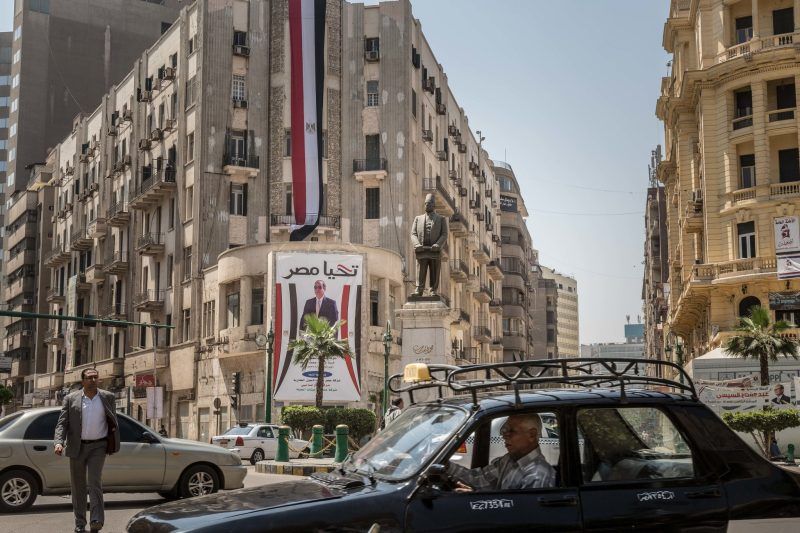
I’ll never forget the words I read scribbled on the wall when I was first put into a cage in a Cairo courtroom, on Feb. 26, 2012: “If defending justice is a crime, then long live criminality.”
That was the first day of my trial, Case No. 173/2011. (In Egyptian courtrooms, defendants are kept in cages.) Along with 42 other defendants, 17 of them Americans, who worked for international nongovernmental organizations in Egypt, I was charged with operating an organization without a license (not true) and receiving illegal foreign funds (also not true). All of us worked for organizations promoting the rule of law, transparency and democracy.
On June 4, 2013, we were found guilty and sentenced to one to five years in prison. The court claimed, with no legal evidence, that we were a threat to national security and were conspiring with foreign agents. But in February of this year, an appeal for a retrial was accepted and in November, it began. Now our ordeal is finally over. On Thursday, a court in Cairo acquitted us of all charges.
I am, of course, very happy to see our innocence finally, officially recognized. And more important, I hope that this news brings some needed optimism to Egyptian civil society groups, some of which are still being similarly prosecuted. But that doesn’t mean I am able to fully celebrate.
Despite the acquittal, I have already been punished, as have my co-defendants in various ways: some of us were unable to find work in Egypt or driven into exile and separated from our children and our parents and our families. In 2012, I was forced to leave Egypt for the United States, while my twins, Adam and Farida, stayed behind. For six years, I have longed for my family and my home.
I hid the truth from the twins, who were 3 years old when I left Egypt and couldn’t come with me for personal and bureaucratic reasons. I told them that I’d gone to Washington for work, not because I was being prosecuted at home. My sister brought them to visit once a year.
Last Christmas, I finally told them the truth. Their wisdom amazed me. “Mommy, you should continue your work,” Adam said. Farida called me a “hero.” Adam added: “We love Egypt. How can we fix things there so nothing like that happens to anyone again?”
That has always been my concern, not my experience of injustice, which, compared to how many other Egyptians have suffered, is relatively minor. How can we fix Egypt? In the last five years, my country has become one of the top jailers of journalists in the world; people are regularly abducted by the security services; torture is common, and so are unfair trials; the right to protest is restricted.
The truth is that what Egypt needs is exactly the kind of work that I and 42 other people were put on trial for doing. Nongovernmental organizations, civil society groups and advocates should oversee the government and examine its structures, making the case for democracy, transparency and accountability.
Is that possible? There are 30 Egyptian civil society members barred from traveling right now. Some have had their assets frozen and have been prosecuted under the very same case 173. Many of them are civil society leaders who have served the cause of democracy and human rights for many years. These people shouldn’t be treated like criminals; they should be allowed to help build Egypt.
After we were granted a retrial, the United States released $195 million of aid that had been withheld partly because of the Egyptian government’s human rights violations and its restrictive law governing nongovernmental organizations.
The acquittals on Thursday would be truly meaningful as a sign of progress if they were the start of a real change to how Egypt governs civil society. This should not stop at our being proven innocent, or at the hoped-for end of the prosecution of the others in Case No. 173. Progress would entail a true reformation of Egypt’s restrictive laws on nongovernmental organizations and a change in attitude from the judiciary.
Case No. 173 began under military rule, lasted throughout the short presidency of Mohammed Morsi, and then was reopened under Egypt’s current president, Abdel Fattah el-Sisi. The heads of state changed, but the structures stayed the same.
The Egyptian government has started taking steps in the right direction: First, the retrial and then, in October, President Sisi announced his intention to change the law on nongovernmental organizations. A committee is supposed to submit a new draft next month to the cabinet before it goes to Parliament. I hope such amendments would really allow human rights and democracy organizations in Egypt to do their work and hold the government accountable without being intimidated, prosecuted or jailed.
This verdict should not be seen as the end of the chapter, but rather as a beginning of many effective reforms. I still remember the words on the wall of that cage.
Nancy Okail is the executive director of the Tahrir Institute for Middle East Policy.
